Edition: 22 May to 2 June 2023
ANTIMICROBIAL RESISTANCE (AMR)
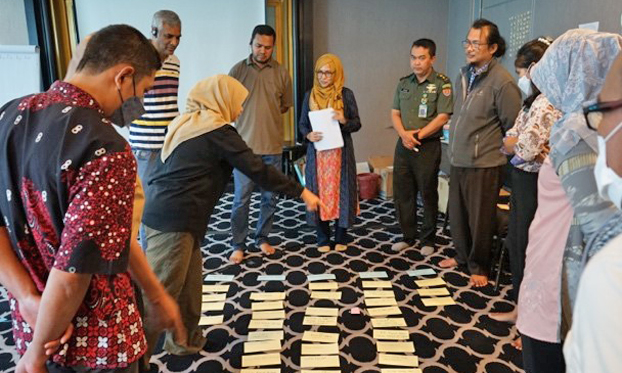 ©FAO/Saskia Soedarjo | INDONESIA AND BANGLADESH Adaptation of AMR control using Bangladesh AMR Response Alliance antimicrobial usage guidelines FAO Indonesia and the Ministry of Agriculture collaborated with Bangladesh AMR Response Alliance (BARA) and FAO Bangladesh to conduct One Health training on the adaptation of AMR control from 23 to 26 May 2023. This event is part of south-south cooperation to improve the response capacity of professionals from human and animal health sectors to control AMR in Indonesia. As one of the first AMR training to bring together animal and human health professionals, this event successfully trained participants on using BARA antimicrobial usage (AMU) guidelines. The guidelines provide comprehensive details on infectious pathogens and corresponding effective antimicrobials following WHO AWaRe categorization. They have been updated based on recent antibiograms and upgraded into a mobile phone app that is easier to be used by trained clinicians and veterinarians for empirical diagnosis and treatment.In addition, the training has also assisted medical professionals in the human and animal health sectors in using antimicrobials prudently and responsibly, as well as helping the Indonesian government improve its existing AMU standards to support the national antimicrobial stewardship programme. |
©FAO/Gunawan Utomo | INDONESIA Tracking AMR country self-assessment survey The Indonesian Coordinating Ministry for Human Development and Cultural Affairs, Ministry of Health, Ministry of Agriculture and other related ministries hosted the seventh round of tracking AMR country self-assessment survey (TrACSS) on 29 May 2023, with support from the Quadripartite (FAO-UNEP-WHO-WOAH). This year's self-assessment results for Indonesia show improvements in several critical areas and the challenges they face. These results will serve as recommendations for strengthening the national AMR control programme in the coming years. |
PARTNERSHIP
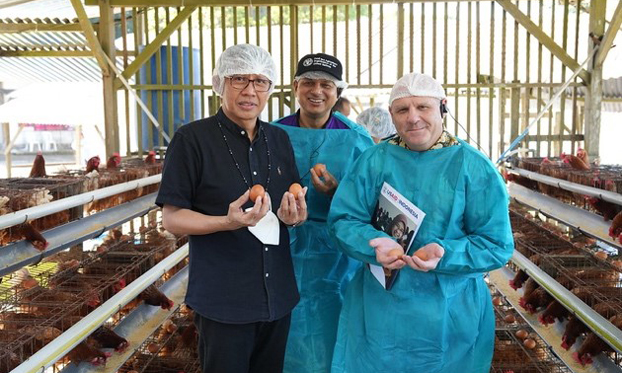 ©FAO/Eko Prianto | INDONESIA USAID Indonesia Mission Director visits FAO work in Yogyakarta |
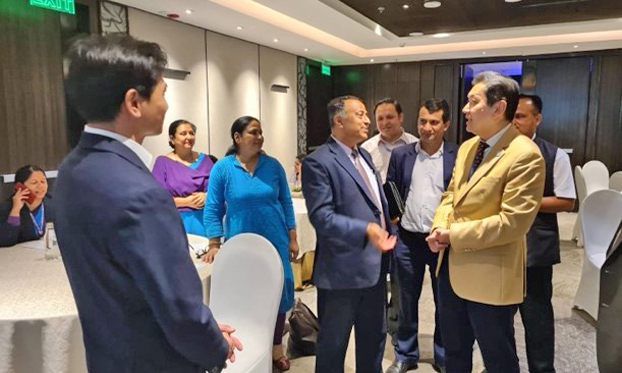 ©FAO/Suman Giri | NEPAL AND ASIA AND THE PACIFIC REGION FAO strengthens partnerships with Nepal in the animal health sector
|
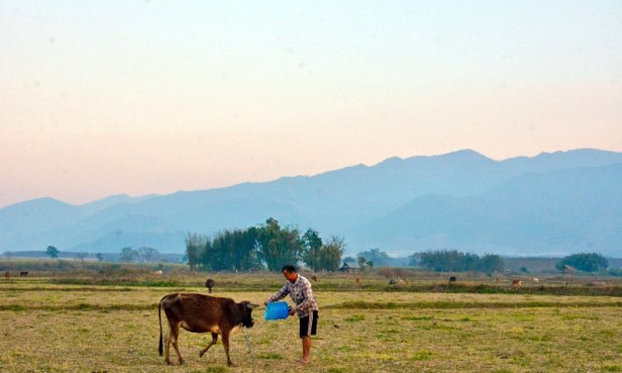 ©FAO/Rindu Putri | ASIA AND THE PACIFIC REGION FAO and China close the project in Greater Mekong Subregion
|
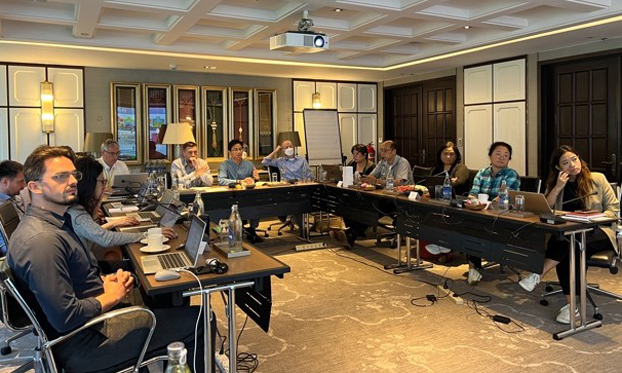 ©FAO/Rindu Putri | ASIA AND THE PACIFIC REGION USAID technical deep dive on workforce development |
AFRICAN SWINE FEVER (ASF)
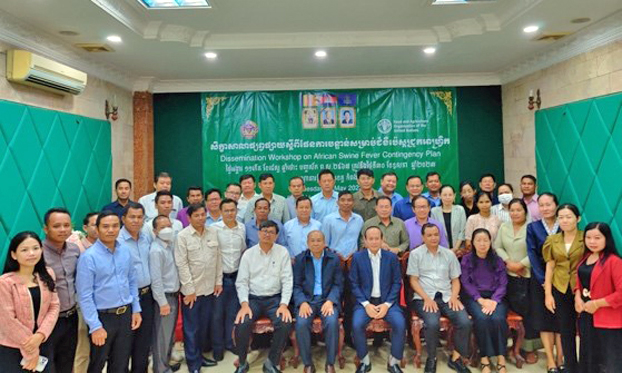 ©FAO/Sideth Dith | CAMBODIA Dissemination workshop on the ASF contingency plan FAO co-facilitated with the General Directorate of Animal Health and Production (GDAHP) on the dissemination workshop on the ASF contingency plan to 24 provincial offices and one municipal office of animal health and production in Cambodia thanks to the support of USAID's Bureau for Humanitarian Assistance (BHA). The workshop aimed to ensure the ASF contingency plan is appropriately used to prevent, detect early and promptly respond effectively to ASF as well as evaluate the participants' knowledge between pre- and post-dissemination of the ASF contingency plan. |
ONE HEALTH
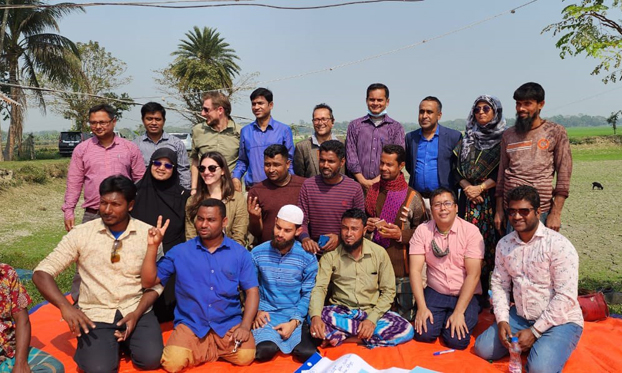 ©FAO Bangladesh | BANGLADESH From poultry to fish: adopting the Upazila to Community initiative to finfish biosecurity training module FAO has been supporting the Department of Livestock Services in carrying out a national programme of poultry biosecurity and vaccinations through the Upazila to Community (U2C) initiative. U2C focuses on training women –the usual custodians of livestock – on vaccination, biosecurity and surveillance, thanks to the continuous support from USAID. As part of a One Health approach, the U2C initiative has been adopted to improve fish biosecurity. A team of experts – from FAO, the Department of Fisheries, the Fish Inspection and Quality Control, Bangladesh Fisheries Research Institute, the UK’s FAO Reference Centre for AMR and WorldFish – drafted biosecurity guidelines for finfish aquaculture production systems after performing a participatory biosecurity gap assessment and participatory disease search activities in Mymensingh. Next, the team will develop a participatory biosecurity training module. |
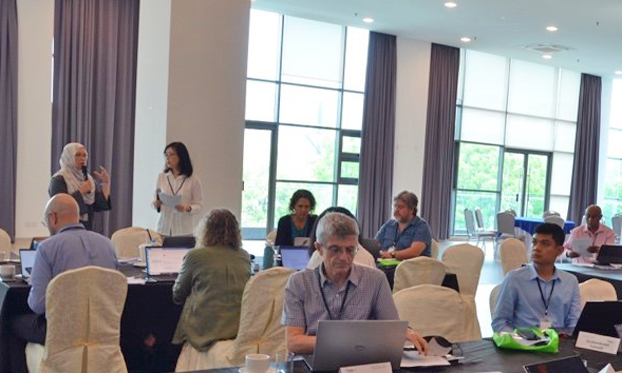 ©NASEM and INGSA | ASIA AND THE PACIFIC REGION Support in the development of the guidebook on countering zoonotic spillover of high-consequence pathogens in Southeast Asia FAO participated in the fifth workshop on countering zoonotic spillover of high-consequence pathogens organized by the United States National Academies of Sciences, Engineering, and Medicine (NASEM) and the International Network for Government Science Advice (INGSA) in Southeast Asia from 1 to 3 June 2022 in Malaysia. A total of 27 experts from partner organizations and countries participated in the workshop. FAO highlighted the importance of animal health, environmental health, One Health and the Quadripartite’s initiatives in the draft guideline. |
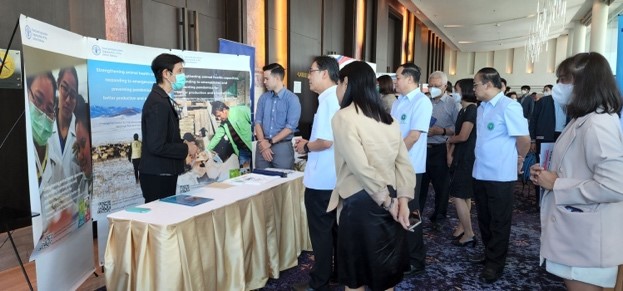 ©ddc | ASIA AND THE PACIFIC REGION One Health meeting in Thailand The Department of Disease Control (DDC) under the Ministry of Public Health Thailand convened the grand opening meeting to introduce the international strategic plan 2023-2027 on 31 May 2023. FAO promoted the initiatives and achievements under animal health threats prevention and control and other collaborative activities in Thailand. The meeting also highlighted the implementation and achievements of health security. |
